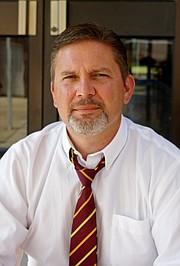As a new legislative session begins in Mississippi, one of the hot topics will be education. Legislators will file bills and make proposals to "improve" our "abysmal failure" of a public-school system. But are our schools really such a failure? Admittedly, we can improve as educators work to make our schools better, but to those who constantly hammer on our public schools as being worse than ever before, I'd like to make a few points.
In 1990, the year I graduated from a Mississippi public school, students may have taken an achievement test as a diagnostic tool, but it wasn't tied into any accountability system. The graduation rate in Mississippi was around 61 percent. And we only needed 18 credits in the following: four English, two social studies, two mathematics, two science and eight electives. The "exit exam" was the Functional Literacy Exam, which only tested students on basic reading, grammar and mathematics.
If a child attended a Mississippi kindergarten back then, the focus was on "Total Person" learning (emotionally, socially, physically and intellectually). Teachers realized these children went through similar stages, but at individual rates, and they structured goals accordingly. Learning focused on the senses, attitudes, emotions, environment and interactions.
Nearly three decades later, schools and teachers are rated based on student proficiency on standardized tests. For years, these tests were the Mississippi Curriculum Test (and its revision as MCT2), but last year, Mississippi students in grades 3-8 took the Partnership for Assessment of Readiness for College and Careers assessment based on Mississippi's College and Career Readiness State Standards (Common Core revised).
Next year, students will take the Mississippi Assessment Program exam, the third change in tests in three years.
Today, in order to graduate from a public school, a Mississippi student must have a minimum of 24 credits in the following: four English (must be English I-IV); four social studies (must include World History, U.S. History, Mississippi Studies, Geography, U.S. Government and Economics); four mathematics (must include Algebra I and Geometry); four science (must include Biology I and either Chemistry or Physical Science); one health/PE; two business/technology (must include an Information and Communications Technology II; Science, Technology, Engineering and Mathematics (STEM); or Foundations course); one art; and four electives.
Even then, the student must also pass the Subject Area Test for Algebra I, Biology I, English II and U.S. History (or meet a convoluted combination of scores and grades). Despite this, Mississippi's graduation rate is almost 76 percent—about 15 percent higher than in 1990.
Now when students enter kindergarten, they are given a Readiness Test within the first few weeks of school, based on what 4-year-olds should know in areas such as literature; informational text; production and distribution of writing; presentation of knowledge and ideas; conversations in standard English; vocabulary acquisition and usage; counting and comparing numbers; and geometry (knowledge of shapes). Because we do not have universal pre-K in Mississippi, it is not surprising that less than 35 percent of students arrive "ready" for kindergarten.
Even if Mississippi schools and teachers are able to meet these increased standards, manage to overcome the over 34 percent of children in Mississippi living in poverty, and are able to meet the proficiency levels dictated by state law, standards are to be increased whenever 75 percent of Mississippi students score proficient or 65 percent of Mississippi schools or districts rate a B or better. That is, as schools improve, the bar is raised.
So, yes, schools may be falling short of expectations. But when compared to schools of decades ago, we have come a long way.
Shannon Eubanks is the principal of the Enterprise Attendance Center in Brookhaven. Opinions stated here are his own.



Comments
Use the comment form below to begin a discussion about this content.
comments powered by Disqus